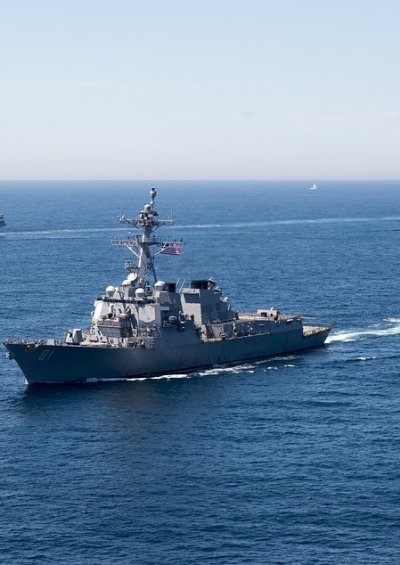Trump and Erdogan’s Blind Spot
Black Sea falls by the wayside in impeachment controversy.
November 15, 2019

Presidents Donald J. Trump and Recep Tayyip Erdogan had a plateful of thorny issues on their agenda when they met in the White House this week.
However, none of the issues, including Turkey’s recent invasion of northern Syria, its acquisition of a Russian anti-missile system and its close ties to Russia and Iran, appear to have been resolved during the meeting between the two men in which five Republican senators critical of Turkey participated.
The failure to narrow differences didn’t stop Mr. Trump from declaring that “we’ve been friends for a long time, almost from day-one. We understand each other’s country. We understand where we are coming from.”
This is all the more remarkable as the entire world well remembers the – even for Mr. Trump – intemperate outbursts against Turkey’s president in recent months.
From Trump’s personal (always personal) perspective, this seems to have all the hallmarks of a true love-hate relationship.
Silence on the Black Sea
Trump’s display of empathy for an illiberal leader aside, what was also remarkable about the meeting is what was not on the two men’s agenda: Security in the Black Sea.
That is all the more remarkable as it lies at the crossroads of Russia, Eastern Europe, the Caucasus and NATO member Turkey.
The Black Sea is a flashpoint in multiple disputes involving Russia. Russia seeks to stretch its power far beyond the country’s internationally recognized borders and thus sees its interventions in Black Sea littoral states like Ukraine and Georgia as an effort to reestablish its former grandeur and thus as fully justified.
For that reason, the Black Sea has long figured prominently among many Washington-based think tanks on the conservative end of the political spectrum. Viewed in that context, the complete silence on this issue by the leader of the current Republican administration is truly remarkable.
Toothless Trump
The utter passivity of the Trump administration was magnified by the disclosure days earlier that Mr. Trump had cancelled a planned U.S. freedom of navigation naval mission in the Black Sea after CNN had portrayed it as American pushback in the region.
The disclosure came in a transcript of closed-door testimony in the U.S. House of Representatives’ impeachment inquiry of Mr. Trump’s policy towards Ukraine by Christopher Anderson, a former advisor to Kurt Volker, the U.S. special representative to Ukraine until he resigned in September.
Mr. Anderson testified that Mr. Trump phoned his then national security advisor, John Bolton, at home to complain about the CNN story. He said the story prompted the president to cancel the routine operation of which Turkey had already been notified.
The cancellation occurred at a moment when reports were circulating in the State Department about an effort to review U.S. assistance to Ukraine. Mr. Anderson said:
We met with Ambassador Bolton and discussed this, and he made it clear that the president had called him to complain about that news report… I can’t speculate as to why…but that…operation was cancelled, but then we were able to get a second one for later in February. And we had an Arleigh-class destroyer arrive in Odessa on the fifth anniversary of the Crimea invasion.
Trump: Dove? Coward? Putin aide?
The operation was cancelled weeks after the Russian coast guard fired on Ukrainian vessels transiting the Strait of Kerch that connects the Black Sea to the Sea of Azov and separates Russian-annexed Crimea from the Russian mainland. “This was a dramatic escalation,” Mr. Anderson said.
Mr. Trump at the time had also put a temporary hold on a condemnatory statement similar to ones that had been issued by the United States’ European allies. Ultimately, statements were issued by U.S. Secretary of State Mike Pompeo and the United Nations ambassador Nikki Haley — but not by the White House.
The Black Sea’s absence in Mr. Trump’s talks with the Turkish leader, coupled with the initial cancellation of the freedom of navigation operation, the initially meek U.S. response to the Strait of Kerch incident, and the fallout of the impeachment inquiry all fit a pattern of Trumpian inaction that has little to do with Trump’s desire to “bring the troops home.”
His remarkably deliberate course of inaction does little to inspire confidence in U.S. policy in key Black Sea countries that include not only Turkey, Ukraine and Georgia, a strategic gateway to Central Asia, but also NATO members Bulgaria and Romania.
The consequences
The absence of the Black Sea in Mr. Trump’s talks with Mr. Erdogan raises the specter that the region could become a victim of the partisan divide in Washington and/or Mr. Trump’s political priorities.
The Republican-dominated U.S. Senate has yet to consider a bipartisan Georgia Support Act that was last month passed by the House of Representatives.
The act would significantly strengthen U.S. defense, economic and cyber security ties with Georgia. Before Mr. Trump’s arrival, passage of such an act by Republicans in the Senate would have been automatic. No longer.
The Black Sea is one region where the United States cannot afford to sow doubt. The damage, however, may already have been done.
Takeaways
From Trump’s always personal perspective, he and Erdogan have a true love-hate relationship.
Trump and Erdogan had many thorny issues on their agenda when they met in the White House. None of them appear to have been resolved.
Trump’s inaction on security in the Black Sea does little to inspire confidence in US policy in key countries in the region – which include NATO members Bulgaria and Romania.
The Black Sea is one region where the US cannot afford to sow doubt. The damage, however, may already have been done.
